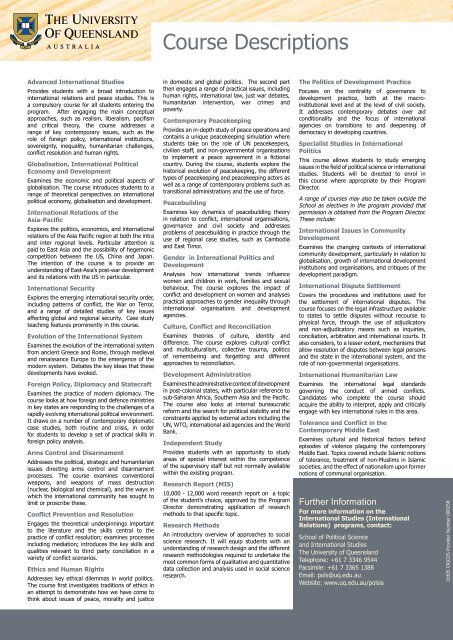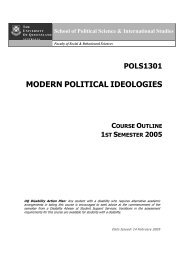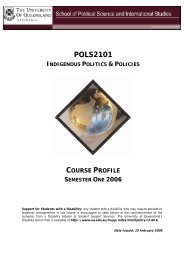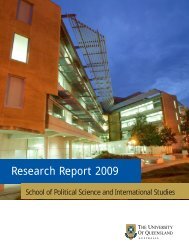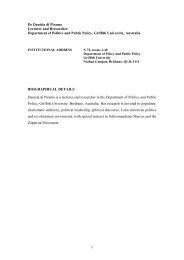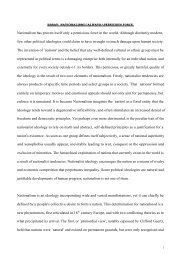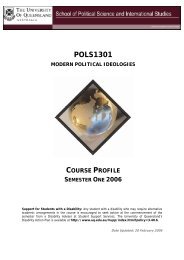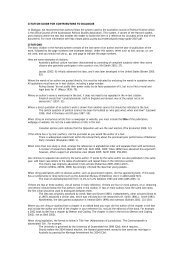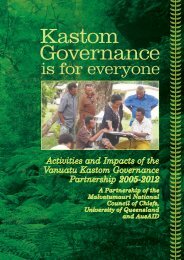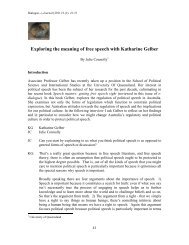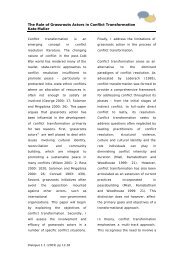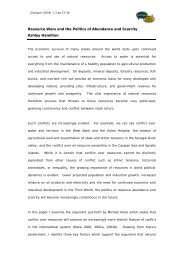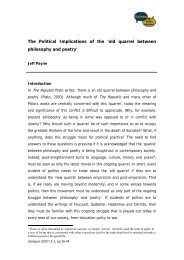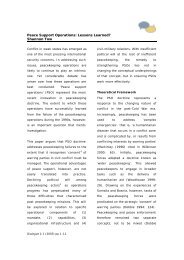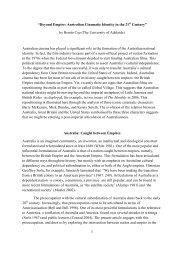International Relations - School of Political Science and ...
International Relations - School of Political Science and ...
International Relations - School of Political Science and ...
Create successful ePaper yourself
Turn your PDF publications into a flip-book with our unique Google optimized e-Paper software.
Course Descriptions<br />
Advanced <strong>International</strong> Studies<br />
Provides students with a broad introduction to<br />
international relations <strong>and</strong> peace studies. This is<br />
a compulsory course for all students entering the<br />
program. After engaging the main conceptual<br />
approaches, such as realism, liberalism, pacifism<br />
<strong>and</strong> critical theory, the course addresses a<br />
range <strong>of</strong> key contemporary issues, such as the<br />
role <strong>of</strong> foreign policy, international institutions,<br />
sovereignty, inequality, humanitarian challenges,<br />
conflict resolution <strong>and</strong> human rights.<br />
Globalisation, <strong>International</strong> <strong>Political</strong><br />
Economy <strong>and</strong> Development<br />
Examines the economic <strong>and</strong> political aspects <strong>of</strong><br />
globalisation. The course introduces students to a<br />
range <strong>of</strong> theoretical perspectives on international<br />
political economy, globalisation <strong>and</strong> development.<br />
<strong>International</strong> <strong>Relations</strong> <strong>of</strong> the<br />
Asia-Pacific<br />
Explores the politics, economics, <strong>and</strong> international<br />
relations <strong>of</strong> the Asia Pacific region at both the intra<br />
<strong>and</strong> inter regional levels. Particular attention is<br />
paid to East Asia <strong>and</strong> the possibility <strong>of</strong> hegemonic<br />
competition between the US, China <strong>and</strong> Japan.<br />
The intention <strong>of</strong> the course is to provide an<br />
underst<strong>and</strong>ing <strong>of</strong> East-Asia’s post-war development<br />
<strong>and</strong> its relations with the US in particular.<br />
<strong>International</strong> Security<br />
Explores the emerging international security order,<br />
including patterns <strong>of</strong> conflict, the War on Terror,<br />
<strong>and</strong> a range <strong>of</strong> detailed studies <strong>of</strong> key issues<br />
affecting global <strong>and</strong> regional security. Case study<br />
teaching features prominently in this course.<br />
Evolution <strong>of</strong> the <strong>International</strong> System<br />
Examines the evolution <strong>of</strong> the international system<br />
from ancient Greece <strong>and</strong> Rome, through medieval<br />
<strong>and</strong> renaissance Europe to the emergence <strong>of</strong> the<br />
modern system. Debates the key ideas that these<br />
developments have evoked.<br />
Foreign Policy, Diplomacy <strong>and</strong> Statecraft<br />
Examines the practice <strong>of</strong> modern diplomacy. The<br />
course looks at how foreign <strong>and</strong> defence ministries<br />
in key states are responding to the challenges <strong>of</strong> a<br />
rapidly evolving international political environment.<br />
It draws on a number <strong>of</strong> contemporary diplomatic<br />
case studies, both routine <strong>and</strong> crisis, in order<br />
for students to develop a set <strong>of</strong> practical skills in<br />
foreign policy analysis.<br />
Arms Control <strong>and</strong> Disarmament<br />
Addresses the political, strategic <strong>and</strong> humanitarian<br />
issues directing arms control <strong>and</strong> disarmament<br />
processes. The course examines conventional<br />
weapons, <strong>and</strong> weapons <strong>of</strong> mass destruction<br />
(nuclear, biological <strong>and</strong> chemical), <strong>and</strong> the ways in<br />
which the international community has sought to<br />
limit or proscribe these.<br />
Conflict Prevention <strong>and</strong> Resolution<br />
Engages the theoretical underpinnings important<br />
to the literature <strong>and</strong> the skills central to the<br />
practice <strong>of</strong> conflict resolution; examines processes<br />
including mediation; introduces the key skills <strong>and</strong><br />
qualities relevant to third party conciliation in a<br />
variety <strong>of</strong> conflict scenarios.<br />
Ethics <strong>and</strong> Human Rights<br />
Addresses key ethical dilemmas in world politics.<br />
The course first investigates traditions <strong>of</strong> ethics in<br />
an attempt to demonstrate how we have come to<br />
think about issues <strong>of</strong> peace, morality <strong>and</strong> justice<br />
in domestic <strong>and</strong> global politics. The second part<br />
then engages a range <strong>of</strong> practical issues, including<br />
human rights, international law, just war debates,<br />
humanitarian intervention, war crimes <strong>and</strong><br />
poverty.<br />
Contemporary Peacekeeping<br />
Provides an in-depth study <strong>of</strong> peace operations <strong>and</strong><br />
contains a unique peacekeeping simulation where<br />
students take on the role <strong>of</strong> UN peacekeepers,<br />
civilian staff, <strong>and</strong> non-governmental organisations<br />
to implement a peace agreement in a fictional<br />
country. During the course, students explore the<br />
historical evolution <strong>of</strong> peacekeeping, the different<br />
types <strong>of</strong> peacekeeping <strong>and</strong> peacekeeping actors as<br />
well as a range <strong>of</strong> contemporary problems such as<br />
transitional administrations <strong>and</strong> the use <strong>of</strong> force.<br />
Peacebuilding<br />
Examines key dynamics <strong>of</strong> peacebuilding theory<br />
in relation to conflict, international organisations,<br />
governance <strong>and</strong> civil society <strong>and</strong> addresses<br />
problems <strong>of</strong> peacebuilding in practice through the<br />
use <strong>of</strong> regional case studies, such as Cambodia<br />
<strong>and</strong> East Timor.<br />
Gender in <strong>International</strong> Politics <strong>and</strong><br />
Development<br />
Analyses how international trends influence<br />
women <strong>and</strong> children in work, families <strong>and</strong> sexual<br />
behaviour. The course explores the impact <strong>of</strong><br />
conflict <strong>and</strong> development on women <strong>and</strong> analyses<br />
practical approaches to gender inequality through<br />
international organisations <strong>and</strong> development<br />
agencies.<br />
Culture, Conflict <strong>and</strong> Reconciliation<br />
Examines theories <strong>of</strong> culture, identity <strong>and</strong><br />
difference. The course explores cultural conflict<br />
<strong>and</strong> multiculturalism, collective trauma, politics<br />
<strong>of</strong> remembering <strong>and</strong> forgetting <strong>and</strong> different<br />
approaches to reconciliation.<br />
Development Administration<br />
Examines the administrative context <strong>of</strong> development<br />
in post-colonial states, with particular reference to<br />
sub-Saharan Africa, Southern Asia <strong>and</strong> the Pacific.<br />
The course also looks at internal bureaucratic<br />
reform <strong>and</strong> the search for political stability <strong>and</strong> the<br />
constraints applied by external actors including the<br />
UN, WTO, international aid agencies <strong>and</strong> the World<br />
Bank.<br />
Independent Study<br />
Provides students with an opportunity to study<br />
areas <strong>of</strong> special interest within the competence<br />
<strong>of</strong> the supervisory staff but not normally available<br />
within the existing program.<br />
Research Report (MIS)<br />
10,000 - 12,000 word research report on a topic<br />
<strong>of</strong> the student’s choice, approved by the Program<br />
Director demonstrating application <strong>of</strong> research<br />
methods to that specific topic.<br />
Research Methods<br />
An introductory overview <strong>of</strong> approaches to social<br />
science research. It will equip students with an<br />
underst<strong>and</strong>ing <strong>of</strong> research design <strong>and</strong> the different<br />
research methodologies required to undertake the<br />
most common forms <strong>of</strong> qualitative <strong>and</strong> quantitative<br />
data collection <strong>and</strong> analysis used in social science<br />
research.<br />
The Politics <strong>of</strong> Development Practice<br />
Focuses on the centrality <strong>of</strong> governance to<br />
development practice, both at the macroinstitutional<br />
level <strong>and</strong> at the level <strong>of</strong> civil society.<br />
It addresses contemporary debates over aid<br />
conditionality <strong>and</strong> the focus <strong>of</strong> international<br />
agencies on transitions to <strong>and</strong> deepening <strong>of</strong><br />
democracy in developing countries.<br />
Specialist Studies in <strong>International</strong><br />
Politics<br />
This course allows students to study emerging<br />
issues in the field <strong>of</strong> political science or international<br />
studies. Students will be directed to enrol in<br />
this course where appropriate by their Program<br />
Director.<br />
A range <strong>of</strong> courses may also be taken outside the<br />
<strong>School</strong> as electives in the program provided that<br />
permission is obtained from the Program Director.<br />
These include:<br />
<strong>International</strong> Issues in Community<br />
Development<br />
Examines the changing contexts <strong>of</strong> international<br />
community development, particularly in relation to<br />
globalisation, growth <strong>of</strong> international development<br />
institutions <strong>and</strong> organisations, <strong>and</strong> critiques <strong>of</strong> the<br />
development paradigm.<br />
<strong>International</strong> Dispute Settlement<br />
Covers the procedures <strong>and</strong> institutions used for<br />
the settlement <strong>of</strong> international disputes. The<br />
course focuses on the legal infrastructure available<br />
to states to settle disputes without recourse to<br />
physical force, through the use <strong>of</strong> adjudicatory<br />
<strong>and</strong> non-adjudicatory means such as inquiries,<br />
conciliation, arbitration <strong>and</strong> international courts. It<br />
also considers, to a lesser extent, mechanisms that<br />
allow resolution <strong>of</strong> disputes between legal persons<br />
<strong>and</strong> the state in the international system, <strong>and</strong> the<br />
role <strong>of</strong> non-governmental organisations.<br />
<strong>International</strong> Humanitarian Law<br />
Examines the international legal st<strong>and</strong>ards<br />
governing the conduct <strong>of</strong> armed conflicts.<br />
C<strong>and</strong>idates who complete the course should<br />
acquire the ability to interpret, apply <strong>and</strong> critically<br />
engage with key international rules in this area.<br />
Tolerance <strong>and</strong> Conflict in the<br />
Contemporary Middle East<br />
Examines cultural <strong>and</strong> historical factors behind<br />
episodes <strong>of</strong> violence plaguing the contemporary<br />
Middle East. Topics covered include Islamic notions<br />
<strong>of</strong> tolerance, treatment <strong>of</strong> non-Muslims in Islamic<br />
societies, <strong>and</strong> the effect <strong>of</strong> nationalism upon former<br />
notions <strong>of</strong> communal organisation.<br />
Further Information<br />
For more information on the<br />
<strong>International</strong> Studies (<strong>International</strong><br />
<strong>Relations</strong>) programs, contact:<br />
<strong>School</strong> <strong>of</strong> <strong>Political</strong> <strong>Science</strong><br />
<strong>and</strong> <strong>International</strong> Studies<br />
The University <strong>of</strong> Queensl<strong>and</strong><br />
Telephone: +61 7 3346 9544<br />
Facsimile: +61 7 3365 1388<br />
Email: pols@uq.edu.au<br />
Website: www.uq.edu.au/polsis<br />
Oct05 CRICOS Provider Number 00025B


